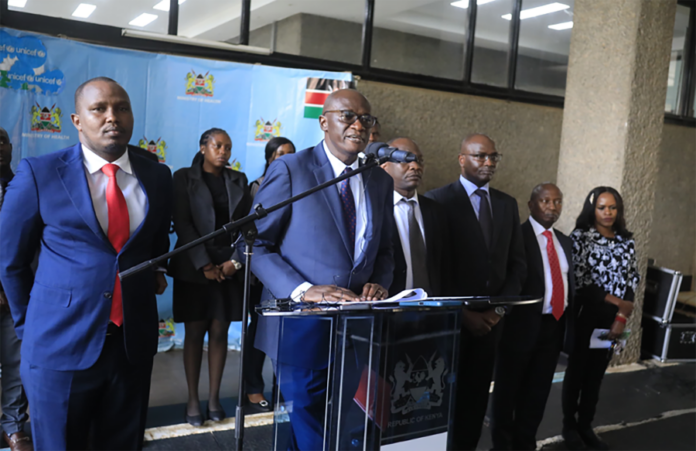The abrupt termination of billions of dollars in U.S. foreign aid has sent shockwaves across Africa’s scientific and healthcare communities. With the cessation of 90% of all awards from the U.S. Agency for International Development (USAID) on 25 February, disease control programs have been halted, clinical trials disrupted, and thousands of local researchers and health workers displaced. As the ramifications of this decision unfold, it has sparked urgent discussions about Africa’s dependence on foreign donors and the need to establish self-sustaining health and scientific funding mechanisms.
Salim Abdool Karim, director of the Centre for the AIDS Programme of Research in South Africa, describes the aid withdrawal as a wake-up call. “We have to become self-reliant. We cannot keep depending on foreign countries to fund essential programs,” he asserts. This sentiment is echoed by molecular biologist Christian Happi, who sees this crisis as an opportunity for African governments to take responsibility for healthcare funding. “Let this be a lesson. The era of waiting for external support must end.”
The Devastating Impact of the Aid Cuts
The U.S. had allocated approximately $12 billion in aid to sub-Saharan Africa in 2024, with a significant portion dedicated to health and humanitarian efforts. Programs such as the President’s Malaria Initiative (PMI), vital vaccination campaigns, and the President’s Emergency Plan for AIDS Relief (PEPFAR) have suffered severe setbacks. South Africa, which has the highest number of people living with HIV globally, stands to lose $439.5 million in PEPFAR funding this fiscal year alone. The abrupt withdrawal of funds is described by experts as “deliberately brutal, disruptive, and chaotic.”
Africa’s reliance on foreign health aid extends beyond the U.S. The Global Fund to Fight AIDS, Tuberculosis, and Malaria allocates around 70% of its $5 billion annual budget to African nations. Gavi, the Vaccine Alliance, contributed approximately $1.2 billion in 2023 for vaccines targeting over 20 infectious diseases. These dependencies highlight the vulnerability of the continent’s healthcare systems when external funding streams are interrupted.
A Legacy of Dependence and the Path to Self-Reliance
Historically, many African nations inherited healthcare systems designed primarily for colonial administrators rather than the local population. This historical imbalance has persisted, with global health funders often directing investments toward high-profile diseases rather than holistic healthcare improvements. Francisca Mutapi, co-director of the Global Health Academy at the University of Edinburgh, argues that external funding has shaped Africa’s healthcare priorities, sometimes at the expense of comprehensive and locally-driven strategies. “When you lack self-determination, you end up following others’ agendas,” she notes.
Furthermore, political and economic influences accompany foreign aid. Catherine Kyobutungi, executive director of the African Population and Health Research Center, observes that donor nations often wield aid as a political tool, shaping African policies to align with their strategic interests. “Foreign aid is not free; it comes with expectations and influence over domestic policies,” she says.
Despite a 2001 pledge by African Union member states to allocate at least 15% of their national budgets to health, the average remains a mere 5.7% as of 2021. Waste and corruption have also eroded funds that could have bolstered domestic healthcare capacity, notes Nigerian virologist Oyewale Tomori.
Strategies for Sustainable Health Financing in Africa
While the crisis poses immediate challenges, it also presents an opportunity for African nations to adopt long-term solutions for sustainable healthcare financing. Some governments have already taken steps toward self-sufficiency. Nigeria has approved an additional $200 million in health funding to offset the shortfall from U.S. aid cuts, and Kenya, Botswana, and Cameroon have pledged to mobilize domestic resources for HIV care.
Several strategic approaches could help African nations achieve financial autonomy in healthcare:
- Tax-Based Healthcare Financing: Countries can introduce new revenue-generating mechanisms such as tobacco taxes, modeled after Zimbabwe’s “AIDS levy,” which has funded HIV programs since 1999.
- Public-Private Partnerships: Collaborations between governments and private entities, such as Kenya’s 2015 agreement with GE Healthcare for radiology services, can enhance healthcare infrastructure.
- Regional Pharmaceutical Manufacturing: Africa’s reliance on imported medications makes it vulnerable to supply chain disruptions. Establishing regional pharmaceutical hubs with harmonized regulatory frameworks could reduce dependence on external drug sources.
- Philanthropic and Community-Based Funding: Encouraging African philanthropists and community-driven health initiatives could bridge funding gaps.
- Investment in Local Scientific Research: Strengthening research institutions and funding local innovations can ensure that Africa’s health challenges are addressed from within rather than relying on external solutions.
Conclusion: Turning Crisis into Opportunity
The withdrawal of U.S. aid, while devastating in the short term, underscores an urgent need for Africa to build resilient healthcare and scientific infrastructures. Moving forward, African nations must take decisive steps to secure independent health funding and foster homegrown solutions to public health challenges. The center of gravity for Africa’s health development should reside in Africa itself. As Happi aptly states, “We must solve our own crises. Our future depends on it.”
















 The African Research (AR) Index is a comprehensive scholarly directory and database focused explicitly on journal publishers that publish and disseminate African research.
The African Research (AR) Index is a comprehensive scholarly directory and database focused explicitly on journal publishers that publish and disseminate African research.

